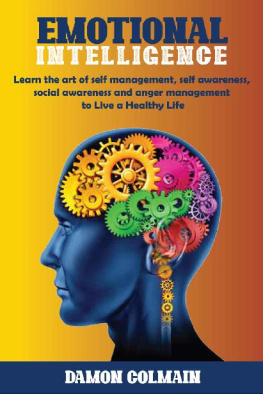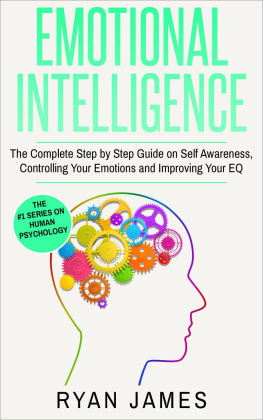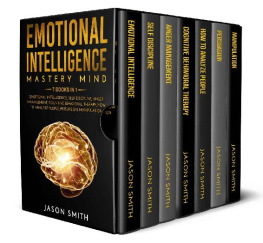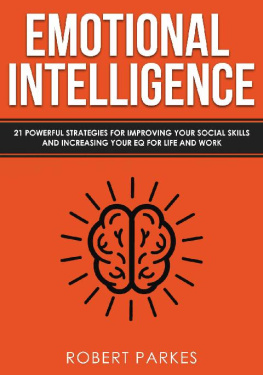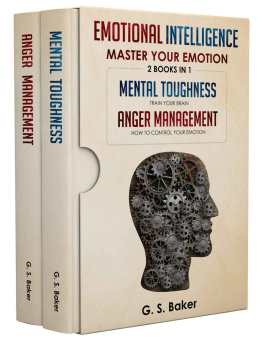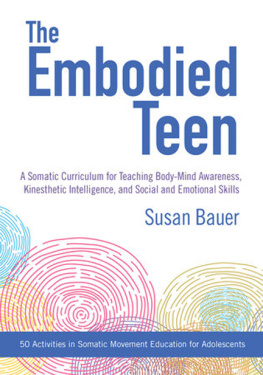Damon Colmain - Emotional Intelligence: Learn the art of self-management, self-awareness, social awareness and anger management to Live a Healthy Life
Here you can read online Damon Colmain - Emotional Intelligence: Learn the art of self-management, self-awareness, social awareness and anger management to Live a Healthy Life full text of the book (entire story) in english for free. Download pdf and epub, get meaning, cover and reviews about this ebook. year: 2020, genre: Home and family. Description of the work, (preface) as well as reviews are available. Best literature library LitArk.com created for fans of good reading and offers a wide selection of genres:
Romance novel
Science fiction
Adventure
Detective
Science
History
Home and family
Prose
Art
Politics
Computer
Non-fiction
Religion
Business
Children
Humor
Choose a favorite category and find really read worthwhile books. Enjoy immersion in the world of imagination, feel the emotions of the characters or learn something new for yourself, make an fascinating discovery.
- Book:Emotional Intelligence: Learn the art of self-management, self-awareness, social awareness and anger management to Live a Healthy Life
- Author:
- Genre:
- Year:2020
- Rating:5 / 5
- Favourites:Add to favourites
- Your mark:
- 100
- 1
- 2
- 3
- 4
- 5
Emotional Intelligence: Learn the art of self-management, self-awareness, social awareness and anger management to Live a Healthy Life: summary, description and annotation
We offer to read an annotation, description, summary or preface (depends on what the author of the book "Emotional Intelligence: Learn the art of self-management, self-awareness, social awareness and anger management to Live a Healthy Life" wrote himself). If you haven't found the necessary information about the book — write in the comments, we will try to find it.
Damon Colmain: author's other books
Who wrote Emotional Intelligence: Learn the art of self-management, self-awareness, social awareness and anger management to Live a Healthy Life? Find out the surname, the name of the author of the book and a list of all author's works by series.
Emotional Intelligence: Learn the art of self-management, self-awareness, social awareness and anger management to Live a Healthy Life — read online for free the complete book (whole text) full work
Below is the text of the book, divided by pages. System saving the place of the last page read, allows you to conveniently read the book "Emotional Intelligence: Learn the art of self-management, self-awareness, social awareness and anger management to Live a Healthy Life" online for free, without having to search again every time where you left off. Put a bookmark, and you can go to the page where you finished reading at any time.
Font size:
Interval:
Bookmark:
Emotional Intelligence
Learn the art of self-management, self-awareness, social awareness and anger management to Live a Healthy Life
By
DAMON COLMAIN
Copyright 2020 by ( DAMON COLMAIN ) - All rights reserved.
This document is geared towards providing exact and reliable information in regards to the topic and issue covered. The publication is sold with the idea that the publisher is not required to render accounting, officially permitted, or otherwise, qualified services. If advice is necessary, legal or professional, a practiced individual in the profession should be ordered.
- From a Declaration of Principles which was accepted and approved equally by a Committee of the American Bar Association and a Committee of Publishers and Associations.
In no way is it legal to reproduce, duplicate, or transmit any part of this document in either electronic means or in printed format. Recording of this publication is strictly prohibited and any storage of this document is not allowed unless with written permission from the publisher. All rights reserved.
The information provided herein is stated to be truthful and consistent, in that any liability, in terms of inattention or otherwise, by any usage or abuse of any policies, processes, or directions contained within is the solitary and utter responsibility of the recipient reader. Under no circumstances will any legal responsibility or blame be held against the publisher for any reparation, damages, or monetary loss due to the information herein, either directly or indirectly.
Respective authors own all copyrights not held by the publisher.
The information herein is offered for informational purposes solely and is universal as so. The presentation of the information is without a contract or any type of guarantee assurance.
The trademarks that are used are without any consent, and the publication of the trademark is without permission or backing by the trademark owner. All trademarks and brands within this book are for clarifying purposes only and are owned by the owners themselves, not affiliated with this document.
Table of contents
Emotional intelligence refers to the ability to identify and manage one's own emotions, as well as other's emotions.
An emotionally intelligent individual is both highly aware of one's own emotional state, even negativity, frustration, sadness, or something more subtle and able to identify and manage it. Such people are particularly attentive to the emotions experienced by others. It is understandable that sensitivity to emotional signals can make one a better friend, parent, leader, or romantic partner both from within oneself and from one's social environment. Luckily those skills can be improved.
E.Q is divided into two categories, each of which has two sub-categories:
Personal Competence, consisting of self-consciousness and self-management;
Social skills consisting of social awareness and the management of relationships Self-awareness is your understanding of yourself and what makes you tick. It is your ability to clearly identify what you need for your own emotional and mental stability individually. Self-management, put simply, is either your ability to do it for yourself or not. It's your ability to put aside short-term satisfaction in pursuing long-term gratification, to define clearly what will give you fulfillment in life and your determination to go after it. Those two traits make up your sense of personal ability.
Social awareness is your ability to grasp the emotions of other people and to understand what drives them. Your ability to observe and listen, to perceive what others think and feel, even if you don't feel the same way, determines it. Your sense of social consciousness is directly tied to your ability to read other people. Relationship management is your ability to use your awareness of other emotions regarding your own to successfully navigate interactions with people. That will ensure clear communication and effective conflict management. These two traits are what make up your sense of social skill.
Emotional intelligence is generally said to consist of at least three skills: emotional awareness, or the ability to identify and name one's own emotions; the ability to harness those emotions and apply them to tasks such as thinking and solving problems; and the ability to manage emotions, which involves both regulating one's own emotions when needed and supporting others do the same.
There is no validated psychometric scale or test for emotional intelligence, as there is for "g," the general intelligence factor and many argue, therefore, that emotional intelligence is not an actual construct, but a way to describe interpersonal skills that go by other names.
Despite this criticism, there has been widespread acceptance of the concept of emotional intelligence sometimes referred to as the emotional quotient or EQ. Some employers have even integrated emotional intelligence tests into their application and interview processes in recent years, on the theory that someone high in emotional intelligence would become a better coworker or leader.
While some research has found a link between job performance and emotional intelligence, many others have shown no correlation, and the lack of a scientifically valid scale makes it hard to really measure or predict somebody's emotional intelligence on the job or at home.
Emotional intelligence may lead us on the road to a fulfilled and happy life by providing a structure for applying intelligence principles to emotional responses, and recognizing that these responses may be logically consistent or incompatible with particular emotional beliefs.
As the workforce changes, so does the research body confirming that individuals (from interns to managers) with higher EI are better equipped to function cohesively within teams, cope more effectively with change and manage stressthereby allowing them to achieve business goals more efficiently.
Goleman (1995) identified five distinct categories of skills that are the key features of EI and proposed that, unlike the intelligence quotient (IQ), these categorical skills can be acquired where they are missing and strengthened where they are present.
Thus, Emotional Intelligence (EI), unlike its relatively fixed cousin, (IQ) Intelligence quotient, is instead a dynamic aspect of one's psyche and includes behavioral traits that can yield significant benefits when worked on, ranging from personal happiness and well-being to elevated professional success.
EQ is not IQ's opponent. Its possible to have a high level of both Life is, however, an inherently sociable construct. Without the ability to function well in this context of relationships, it is doubtful how far intelligence alone will get you. As Theodore Roosevelt put it: "No one cares how much you know until they know how much you care." Emotional Quotient (EQ) is the basis of being human in many ways.
Emotional intelligence, and our capability to draw on it as a reserve, helps us in so many ways: from care for our physical and mental health and well-being to inspiring and leading ability. It's there when it comes to conflict resolution in our ability to manage successful partnerships and our arms and shield. It is the driver of success in so many different ways.
EQ, as a success driver, does not apply essentially to our personal lives. It also happens in the workplace. People with average IQ's perform 70 percent of the time over those with the highest IQs. Is EQ the cause? While EQ and IQ aren't enemies, high levels of both are possible, is Emotional Quotient a better sign of success? Given that, as stated by the Center for Creative Leadership, 75 percent of careers are "derailed for reasons related to emotional skills, including the inability to handle interpersonal problems; unsatisfactory team leadership in times of difficulty or conflict; or inability to adapt to change or build confidence," perhaps it Is.
Font size:
Interval:
Bookmark:
Similar books «Emotional Intelligence: Learn the art of self-management, self-awareness, social awareness and anger management to Live a Healthy Life»
Look at similar books to Emotional Intelligence: Learn the art of self-management, self-awareness, social awareness and anger management to Live a Healthy Life. We have selected literature similar in name and meaning in the hope of providing readers with more options to find new, interesting, not yet read works.
Discussion, reviews of the book Emotional Intelligence: Learn the art of self-management, self-awareness, social awareness and anger management to Live a Healthy Life and just readers' own opinions. Leave your comments, write what you think about the work, its meaning or the main characters. Specify what exactly you liked and what you didn't like, and why you think so.

